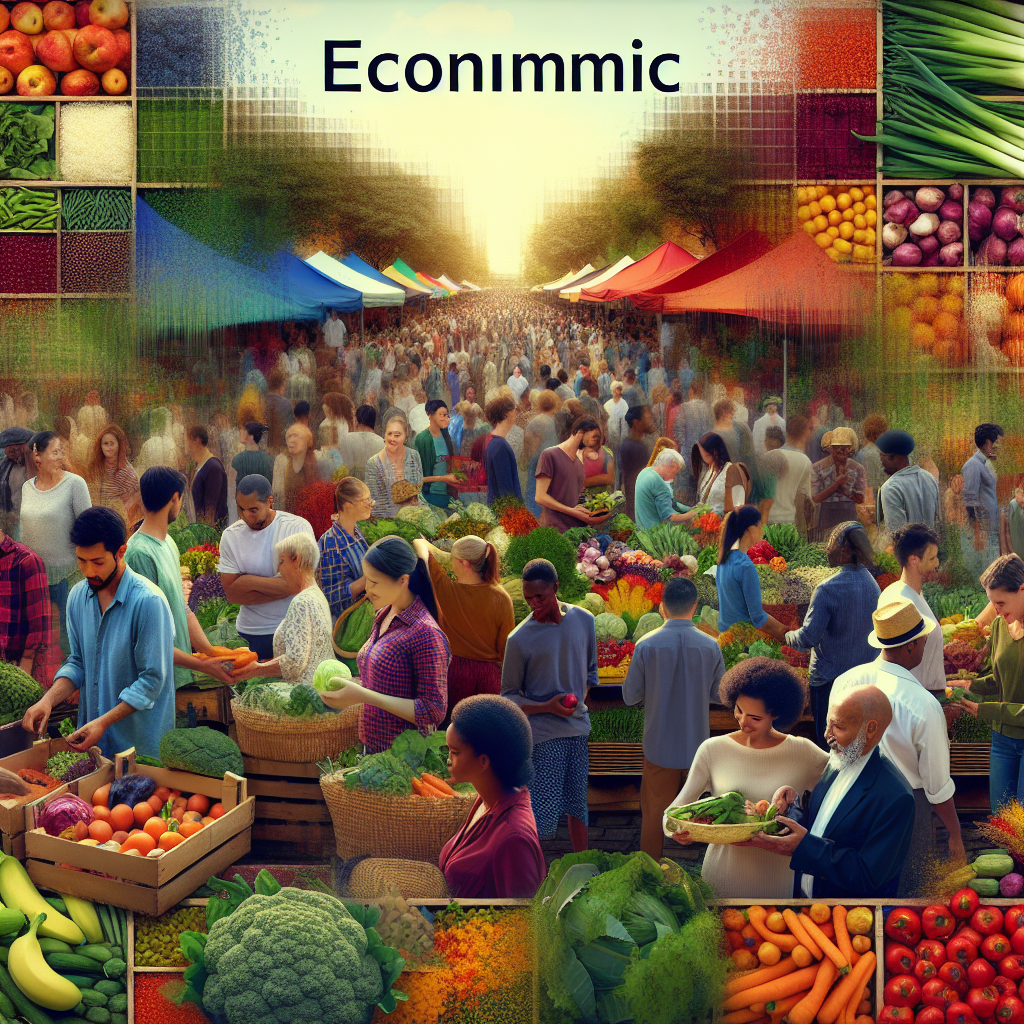
Imagine a bustling farmers’ market, filled with vibrant colors and the delicious aroma of freshly harvested produce. It’s not just a place to purchase locally grown food; it’s also a hub of economic activity for urban farmers. In this article, we will explore the numerous economic benefits of urban farming, with a particular focus on the opportunities that farmers’ markets provide. From increased income for farmers to job creation and community development, urban farming is proving to be a lucrative and sustainable industry, transforming cities into vibrant food hubs. So, grab a seat and get ready to dive into the exciting world of urban farming and the economic possibilities it holds.

Benefits of Urban Farming
Increasing Access to Fresh Produce
Urban farming plays a crucial role in increasing access to fresh produce for urban communities. By growing fruits, vegetables, and herbs locally, farmers’ markets provide a convenient and affordable option for people to access fresh, nutritious foods. This is especially important in areas where traditional grocery stores are scarce, leading to limited choices and higher prices for residents. Furthermore, urban farming helps to combat food deserts, which are areas lacking access to fresh, healthy foods. By bringing fresh produce directly to the city, urban farmers ensure that everyone has the opportunity to enjoy a diverse range of fresh, locally grown foods.
Supporting Local Economy
Farmers’ markets act as catalysts for local economic growth. By purchasing food directly from local farmers, consumers keep money circulating within the community. This leads to the growth and sustainability of local farms and entrepreneurial ventures. Additionally, farmers’ markets create business opportunities for local entrepreneurs, such as food vendors, artisans, and craftsmen. By supporting these small businesses, urban farming stimulates local economic development, encourages entrepreneurship, and creates a vibrant and resilient local economy.
Creating Employment Opportunities
Urban farming not only provides fresh produce, but it also generates employment opportunities. Jobs are created in various stages of the farming and food production process, including planting, harvesting, packaging, and distributing locally grown foods. Additionally, ancillary industries such as food processing and packaging benefit from the increased demand for locally sourced products. From farmers and market vendors to the employees of related industries, urban farming contributes to job creation and generates income for individuals within the community.
Reducing Food Miles
With the rise of industrialized agriculture and global food markets, produce often travels long distances before reaching consumers. This not only increases transportation costs but also contributes to negative environmental impacts, including greenhouse gas emissions from vehicles. Urban farming, especially through farmers’ markets, helps reduce food miles by bringing fresh produce directly to the city. By shortening the distance between food production and consumption, urban farming minimizes transportation costs and lowers its associated environmental impact. Moreover, urban farming promotes sustainable practices by advocating for locally sourced and seasonally available produce.
Farmers’ Markets as Economic Drivers
Enhancing Local Food Systems
Farmers’ markets play a vital role in enhancing local food systems. By connecting urban consumers with local food producers, farmers’ markets create a direct link between farmers and consumers. This allows for transparency, accountability, and a deeper understanding of where and how food is produced. Through this direct exchange, consumers gain a sense of trust and confidence in the quality and freshness of the products they purchase. Additionally, farmers’ markets provide a platform for educating consumers about sustainable farming practices, food origins, and the importance of supporting local agriculture.
Direct Market Sales
One of the key economic benefits of farmers’ markets is the opportunity for direct market sales. Unlike traditional food distribution channels that involve wholesalers and retailers, direct market sales cut out the middlemen. Farmers have a direct line of communication and transaction with consumers, allowing them to retain a higher portion of the profits. This gives farmers greater financial stability and the ability to reinvest in their farms, expand their operations, and improve their sustainable practices. Direct market sales also enable farmers to experiment with unique crops or varieties that may not meet the mass market criteria but appeal to a niche customer base.
Demand for Local and Organic Products
In recent years, there has been a growing consumer preference for sustainable and locally produced food. Consumers are more conscious of the environmental impact of their food choices and seek out products that align with their values. Farmers’ markets meet this demand by offering a wide range of local and organic products. By supporting small-scale farmers, farmers’ markets provide an alternative to large-scale industrial agriculture, which often relies on intensive chemical inputs and monoculture practices. Consumers who choose to buy from farmers’ markets are actively supporting environmentally friendly and sustainable farming methods.
Multiplier Effect
The economic impact of farmers’ markets goes beyond the direct sales made at the market stalls. When money is spent at farmers’ markets, it is reinvested in the local economy. This generates a multiplier effect, as the income earned by farmers and market vendors is spent on other goods and services within the community. In turn, these businesses experience increased revenue, leading to further job creation and economic growth. Additionally, farmers’ markets can spark the creation of spin-off businesses, such as restaurants and artisanal food producers, which further contribute to the local economy. Furthermore, the taxes generated from the economic activities associated with farmers’ markets provide revenue for local governments to invest in public services and infrastructure.

Increasing Access to Fresh Produce
Availability of Locally Grown Foods
One of the primary benefits of urban farming is the availability of locally grown foods. Farmers’ markets ensure a direct supply chain from the farm to the urban consumer, eliminating the need for lengthy transportation and storage. This results in produce that is significantly fresher and retains higher nutritional value compared to products that have been transported long distances. By having access to locally grown foods, urban residents can enjoy a wide array of seasonal fruits, vegetables, and herbs throughout the year.
Reducing Food Deserts
Food deserts, where access to fresh and nutritious food is limited, are prevalent in many urban areas. Farmers’ markets play a crucial role in addressing this issue by bringing fresh produce to these underserved communities. By setting up farmers’ markets in food desert areas, residents have the opportunity to access quality, affordable, and locally grown foods. This helps improve the overall health and well-being of individuals living in these communities and reduces the negative impacts of food disparities.
Promoting Healthy Eating Habits
Urban farming and farmers’ markets promote healthy eating habits by offering fresh, unprocessed, and locally sourced produce. The availability of a wide variety of fruits, vegetables, and herbs encourages individuals to incorporate more plant-based foods into their diets. Farmers’ markets often feature unique and heirloom varieties that are not commonly found in traditional grocery stores. This encourages diversity and experimentation in food choices, ultimately leading to a more nutritious and balanced diet. By promoting healthy eating habits, urban farming contributes to the prevention of chronic diseases and improves overall public health.
Supporting Local Economy
Keeping Money within the Community
When consumers purchase produce from farmers’ markets, they are supporting local farmers and businesses, as the money stays within the community. Unlike large grocery store chains or online retailers, where a significant portion of the profits goes to headquarters or shareholders, farmers’ markets allow consumers to directly contribute to the local economy. The money spent at farmers’ markets helps sustain local farmers, supports their families, and invests in the growth and maintenance of local agricultural infrastructure.
Creating Business Opportunities for Local Entrepreneurs
Farmers’ markets serve as a breeding ground for local entrepreneurs. These markets provide aspiring business owners with a platform to start their ventures, whether it be selling prepared foods, handmade crafts, or specialty products. The relatively low barriers to entry in farmers’ markets enable entrepreneurs to test their ideas, build a customer base, and refine their products. The supportive community atmosphere of farmers’ markets nurtures these up-and-coming businesses, fostering a spirit of creativity and entrepreneurship within the local economy.
Stimulating Economic Growth
The economic impact of farmers’ markets extends beyond the immediate transactions occurring within the market stalls. By fostering a robust local food system, farmers’ markets stimulate economic growth in various ways. The increased demand for locally grown produce creates a ripple effect, leading to increased revenue for farmers, job creation in the farming and food production sectors, and the stimulation of ancillary industries such as food processing and packaging. The growth and success of farmers’ markets contribute to a thriving local economy, attracting investment, supporting tourism, and enhancing the overall quality of life in the community.

Creating Employment Opportunities
Job Creation in Farming and Food Production
Urban farming and farmers’ markets generate employment opportunities in farming and food production. As the demand for locally grown produce continues to rise, more farmers are needed to cultivate and harvest crops. This leads to job creation in primary agricultural activities, such as planting, nurturing, and harvesting crops. Additionally, urban farming often requires specialized skills and knowledge in sustainable farming practices, hydroponics, or rooftop gardening. This opens up opportunities for individuals with expertise in these areas to contribute to the urban farming industry.
Supporting Ancillary Industries (e.g., Food Processing, Packaging)
The success of farmers’ markets also benefits ancillary industries involved in the production and distribution of locally grown products. Food processing and packaging companies, for example, experience increased demand as farmers require assistance in transforming raw produce into value-added products. These processes create employment opportunities and contribute to the overall growth and stability of the local economy. By supporting these ancillary industries, urban farming generates a chain of economic activities that provide jobs and income for individuals within the community.
Generating Income for Farmers and Market Vendors
Urban farming and farmers’ markets provide income-generating opportunities for farmers and market vendors. Farmers who sell their products directly to consumers at farmers’ markets can obtain higher profit margins compared to selling through intermediaries like wholesalers or retailers. This allows farmers to sustain their operations, invest in infrastructure, and improve agricultural practices. Market vendors, such as food artisans or craftsmen, also benefit from the direct sales at farmers’ markets. By participating in farmers’ markets, these vendors can showcase their unique products directly to consumers, leading to increased sales and income for their businesses.
Reducing Food Miles
Minimizing Transportation Costs
One of the major advantages of urban farming and farmers’ markets is the reduction in food miles. Food miles refer to the distance food travels from the farm to the consumer. Traditional food distribution systems often involve long supply chains, with produce being transported across states or even countries. This transportation incurs significant costs, including fuel, vehicle maintenance, and labor. By bringing fresh produce directly to urban areas through farmers’ markets, food miles are significantly reduced, resulting in lower transportation costs for both farmers and consumers.
Lowering Environmental Impact
The reduction in food miles achieved through urban farming and farmers’ markets also has significant environmental benefits. Long-distance transportation of produce contributes to greenhouse gas emissions and air pollution. By shortening the distance between food production and consumption, urban farming helps reduce the carbon footprint associated with the food system. Additionally, urban farming often embraces sustainable practices such as organic farming, composting, and water conservation, further reducing the environmental impact of food production.
Supporting Sustainable Practices
Urban farming and farmers’ markets prioritize sustainability by advocating for locally sourced and seasonal produce. By promoting a strong connection between producers and consumers, urban farming encourages responsible agricultural practices. Farmers are incentivized to adopt sustainable farming methods, such as organic or regenerative agriculture, as consumers demand healthier and environmentally friendly products. Urban farming initiatives also foster education and awareness about sustainable food systems, encouraging individuals to make more conscious and environmentally responsible choices.

Enhancing Local Food Systems
Connecting Urban Consumers with Local Food Producers
Farmers’ markets bridge the gap between urban consumers and local food producers. Many people are disconnected from the sources of their food and have little knowledge about how it is grown or processed. Farmers’ markets provide an opportunity for consumers to meet and engage with the farmers who produce their food. This direct connection fosters trust, transparency, and a deeper appreciation for the hard work and dedication of farmers. By closing this gap, farmers’ markets enhance the local food system and promote a culture of sustainable and responsible food consumption.
Increasing Food Security
Locally grown food and farmers’ markets contribute to improving food security within urban areas. When communities rely heavily on long-distance food imports, they are vulnerable to disruptions in the global or national food supply chains. Urban farming decreases the dependence on external sources of food and enhances the resilience of local food systems. By producing a significant portion of the food consumed within the community, urban farming ensures a more reliable and consistent supply of fresh produce, reducing the risk of food scarcity during times of crisis or natural disasters.
Diversifying Food Options
Farmers’ markets provide consumers with a diverse range of food options that are not commonly found in mainstream grocery stores. Many farmers specialize in growing unique and heirloom varieties that are often overlooked by large-scale agricultural operations. Farmers’ markets celebrate this diversity, offering consumers the chance to explore new flavors, textures, and cultural culinary traditions. Furthermore, urban farming initiatives often support niche crops, such as medicinal herbs or specialty vegetables, catering to specific dietary needs or preferences. This diversification of the local food system not only expands consumer choices but also strengthens the overall resilience and sustainability of the community.
Direct Market Sales
Cutting Out Middlemen (e.g., Wholesalers, Retailers)
One of the primary advantages of farmers’ markets is the elimination of intermediaries, such as wholesalers and retailers. These intermediaries often take a significant portion of the profits, leaving farmers with minimal returns for their hard work. By selling directly to consumers, farmers’ markets allow farmers to receive a higher percentage of the revenue generated from their products. This direct market sales model empowers farmers to have greater control over their pricing, marketing strategies, and product quality, resulting in increased financial stability and sustainability for their businesses.
Higher Profit Margins for Farmers
Farmers who sell their products at farmers’ markets benefit from higher profit margins compared to other distribution channels. By avoiding the fees and commissions charged by intermediaries, farmers can set prices that appropriately reflect the true value of their products. This ensures that farmers receive fair compensation for their labor, production costs, and investments. Higher profit margins provide farmers with a reliable income stream, allowing them to reinvest in their farms, adopt sustainable practices, and improve the overall quality of their products.
Building Stronger Relationships between Farmers and Consumers
The direct interaction between farmers and consumers at farmers’ markets builds trust, fosters relationships, and encourages loyalty. Consumers have the opportunity to speak directly with the farmers, ask questions about the growing process, and gain insight into the local agricultural practices. This transparency builds confidence in the quality and freshness of the products. Similarly, farmers can receive feedback directly from consumers, allowing them to improve their offerings and tailor their products to meet consumer preferences. This direct relationship between farmers and consumers not only benefits both parties but also creates a stronger sense of community and shared values.

Demand for Local and Organic Products
Growing Consumer Preferences for Sustainable Food
Consumers today are increasingly concerned about the environmental and social impact of their food choices. As a result, there is a growing demand for sustainable and locally produced food. Farmers’ markets meet this demand by offering a wide range of locally grown and organic products. Many farmers who participate in farmers’ markets prioritize sustainable farming practices, such as organic or regenerative agriculture, which minimize the use of synthetic chemicals and promote environmental stewardship. By supporting farmers’ markets, consumers actively contribute to the sustainability of the food system and the protection of our natural resources.
Increasing Awareness of Health Benefits
Consumers are becoming more aware of the health benefits associated with consuming fresh and locally grown produce. Farmers’ markets not only offer a diverse selection of fruits, vegetables, and herbs but also provide access to superior quality products that are harvested at peak ripeness. Locally grown produce is often more nutrient-dense compared to products that have been transported long distances or stored for prolonged periods. By choosing to buy from farmers’ markets, consumers can enhance their dietary intake with nutritious foods, contributing to their overall health and well-being.
Supporting Small-Scale Farmers
Large-scale industrial agriculture often dominates the food market, making it challenging for small-scale farmers to compete. Farmers’ markets provide an avenue for small-scale farmers to thrive and be financially viable. By purchasing from farmers’ markets, consumers actively support the livelihoods of these small-scale farmers, preserving the diversity of the agricultural landscape. The demand for locally grown and organic produce stimulates the growth and sustainability of small-scale farming operations, ensuring that they can continue to operate in an industry dominated by large corporations.
Multiplier Effect
Reinvesting Money in Local Economy
The money spent at farmers’ markets has a multiplier effect, meaning it has a broader economic impact beyond the immediate transaction. When consumers buy products at farmers’ markets, the income earned by farmers and market vendors is reinvested within the local economy. Farmers can purchase seeds, equipment, and supplies from local businesses, stimulating other sectors within the community. Market vendors may spend their earnings on renting commercial kitchens, purchasing materials for their crafts, or investing in new products or services. This cycle of reinvestment creates a positive economic feedback loop, contributing to the overall prosperity of the community.
Creating Spin-Off Businesses
The success of farmers’ markets often spurs the creation of spin-off businesses. As consumers develop a taste for locally grown and artisanal products, entrepreneurs seize the opportunity to cater to this demand. Small-scale food processors, such as jam makers or cheese producers, often emerge from farmers’ markets. These businesses can benefit from the direct customer feedback and exposure gained at farmers’ markets. Likewise, restaurants and cafes that prioritize local and seasonal ingredients may choose to source their supplies from farmers’ markets, further strengthening the local food ecosystem and contributing to the overall vitality of the community.
Generating Tax Revenue
The economic activities associated with farmers’ markets generate tax revenue for local governments. As farmers and market vendors earn income and reinvest in their businesses, they contribute to sales tax, property tax, and other local taxes. This revenue can be used to support public services, maintain infrastructure, and invest in community development projects. Furthermore, the economic growth stimulated by farmers’ markets can attract tourists and visitors, who further contribute to the local economy through spending on accommodations, meals, and entertainment. The generated tax revenue plays a vital role in the overall fiscal health and prosperity of the community.
In conclusion, urban farming, especially through the presence of farmers’ markets, offers numerous economic opportunities. By increasing access to fresh produce, supporting the local economy, creating employment opportunities, and reducing food miles, urban farming contributes to the growth and sustainability of communities. Farmers’ markets act as economic drivers by enhancing local food systems, facilitating direct market sales, meeting the demand for local and organic products, and generating a multiplier effect. Through these economic benefits, urban farming and farmers’ markets promote healthier eating habits, connect consumers with local food producers, support small-scale farmers, and contribute to overall economic growth and vitality. By embracing urban farming and supporting farmers’ markets, individuals and communities can reap the financial, health, and environmental rewards of a thriving local food system.






